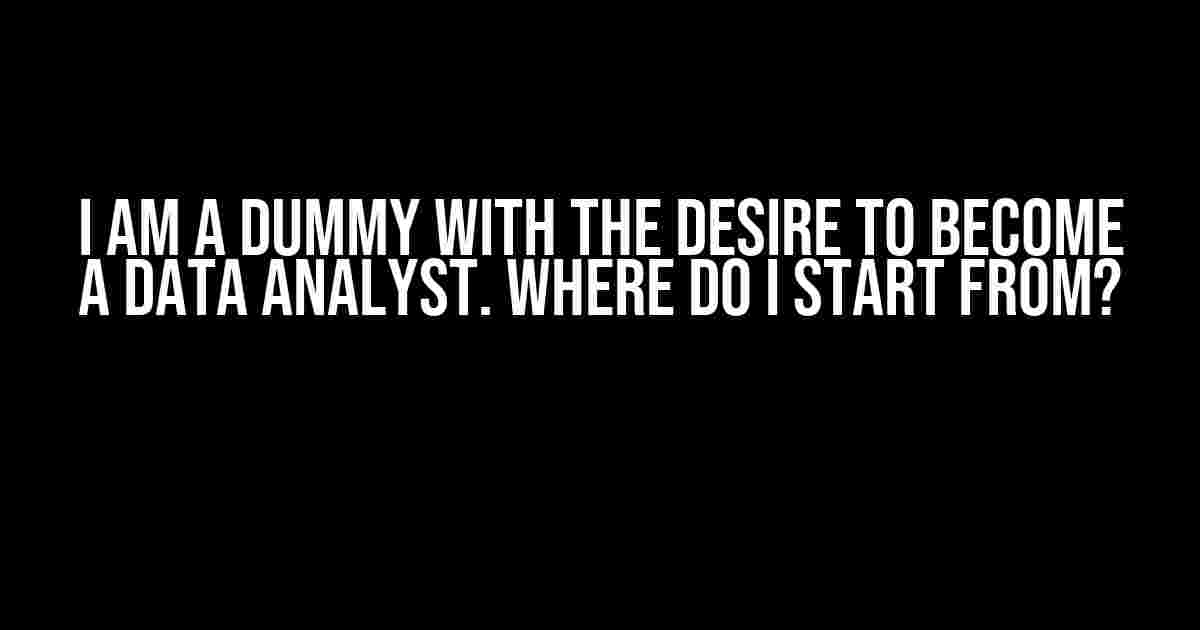Embarking on a new career path can be daunting, especially when it comes to a field as complex as data analysis. However, with dedication and a clear starting point, you can overcome any obstacles and achieve your goals.
Step 1: Understand the Fundamentals of Data Analysis
Before diving into the world of data analysis, it’s essential to grasp the basics. Start by learning what data analysis is, its applications, and the types of data analysts. Familiarize yourself with key concepts such as:
- Data mining
- Data visualization
- Statistical modeling
- Data storytelling
Step 2: Acquire the Necessary Skills
To become a successful data analyst, you’ll need to develop a range of skills, including:
- Mathematics and statistics: Brush up on your math skills, particularly in areas like algebra, calculus, and statistics.
- Programming: Learn at least one programming language, such as Python, R, or SQL.
- Data visualization tools: Familiarize yourself with data visualization tools like Tableau, Power BI, or D3.js.
- Data analysis software: Learn popular data analysis software like Excel, pandas, or NumPy.
- Communication: Develop strong communication skills to effectively present insights to stakeholders.
Step 3: Pursue Relevant Education and Training
Enroll in online courses, certification programs, or degree programs to gain a deeper understanding of data analysis. Some popular resources include:
- DataCamp
- Coursera
- edX
- Data Science Council of America (DASCA)
- Certified Data Analyst (CDA) certification
Step 4: Gain Practical Experience
Apply your skills to real-world projects or participate in data analysis competitions to gain hands-on experience. You can:
- Participate in Kaggle competitions
- Work on personal projects using publicly available datasets
- Volunteer for data analysis projects for non-profit organizations
- Join online communities like Reddit’s r/dataanalysis and r/learnprogramming
Step 5: Network and Build Your Professional Profile
Connect with professionals in the data analysis field and build a strong online presence:
- Attend industry events and conferences
- Join data analysis groups on LinkedIn
- Create a professional LinkedIn profile
- Develop a personal website or blog to showcase your projects and skills
Conclusion
Becoming a data analyst requires dedication, persistence, and a willingness to learn. By following these steps, you’ll be well on your way to achieving your goal. Remember to stay focused, stay motivated, and always keep learning.
Frequently Asked Question
Are you a dummy with a desire to become a data analyst? Well, you’re in luck! We’ve got the lowdown on where to start and how to get going.
Q1: What skills do I need to become a data analyst?
Ah, great question! To become a data analyst, you’ll need to develop skills in areas like statistics, data visualization, and data manipulation. Familiarize yourself with tools like Excel, Python, R, and SQL. Don’t worry if you don’t know what those are yet – we’ll get to that later!
Q2: Where can I learn these skills?
There are tons of online resources available! Websites like Coursera, edX, and DataCamp offer courses and tutorials on data analysis. You can also check out online communities like Kaggle, GitHub, and Reddit’s r/learnprogramming and r/dataanalysis. And, of course, don’t forget about YouTube tutorials and online forums!
Q3: Do I need a degree in data analysis or can I learn on my own?
While a degree in data analysis or a related field can be helpful, it’s not necessarily required. Many successful data analysts are self-taught and have learned through online courses, boot camps, and real-world experience. What’s most important is having a willingness to learn and dedication to practicing your skills.
Q4: What kind of projects should I work on to gain experience?
To gain practical experience, work on projects that challenge you and align with your interests! Try analyzing data from sources like Kaggle, UCI Machine Learning Repository, or even your own personal data (like your fitness tracker or social media habits). You can also participate in data analysis competitions or collaborate with others on projects.
Q5: How long will it take me to become a data analyst?
The million-dollar question! The amount of time it takes to become a data analyst varies depending on your starting point, dedication, and goals. With consistent effort, you can develop basic skills in a few months and intermediate skills in a year or two. The key is to set achievable milestones, stay motivated, and keep learning!

